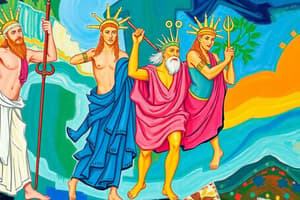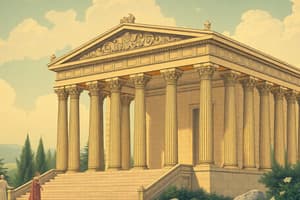Podcast
Questions and Answers
What distinguishes gods from humans in Greek mythology?
What distinguishes gods from humans in Greek mythology?
- Gods are immortal. (correct)
- Gods can make mistakes.
- Gods have children.
- Gods are emotional beings.
Which of the following was a central belief of the Greeks regarding disease?
Which of the following was a central belief of the Greeks regarding disease?
- Disease could be cured through scientific methods.
- Disease was considered a natural phenomenon.
- Disease was a punishment from the gods. (correct)
- Disease was solely genetic.
What method did Socrates use to provoke thought and discussion?
What method did Socrates use to provoke thought and discussion?
- Promoting democracy.
- Conducting experiments.
- Philosophical essays.
- Asking difficult questions. (correct)
What is considered the home of the gods and goddesses in Greek mythology?
What is considered the home of the gods and goddesses in Greek mythology?
What term describes the collection of stories about the Greek gods?
What term describes the collection of stories about the Greek gods?
Flashcards
Polytheism
Polytheism
Belief in multiple gods, each with their own powers and personalities. Greek gods were similar to humans, experiencing emotions and conflicts, yet they possessed immortality.
Greek Mythology
Greek Mythology
Stories about Greek gods and goddesses, often explaining natural events or human behavior.
Science in Ancient Greece
Science in Ancient Greece
The practice of seeking explanations for natural phenomena through observation and reason, not just divine intervention.
Philosophy
Philosophy
Signup and view all the flashcards
Democracy
Democracy
Signup and view all the flashcards
Study Notes
Greek Religion
- Greeks had a polytheistic religion, believing in many gods.
- Gods had relationships (children, enemies, lovers) and emotions.
- Gods were immortal, unlike humans.
- Each god had specific responsibilities.
- Examples of gods: Zeus (supreme god), Poseidon (sea god), Hades (underworld god).
- Greeks believed gods influenced events like weather, health, marriage, and childbirth.
- Offerings (wine, fruit) were made to gods at altars in temples.
- Myths are stories told about the gods.
Greek Science
- Greeks sought natural explanations for phenomena.
- Initially, disease was seen as divine punishment.
- Later, Greeks sought natural causes for disease, and other phenomena.
- This approach is the foundation of modern science.
- Greeks expanded this scientific method though they weren't the first.
Greek Philosophy
- Greek philosophers explored concepts like good, bad, beauty, and ugliness.
- Philosophers questioned fundamental values.
- Socrates challenged people's assumptions through questioning.
- Socrates opposed democracy because he believed that people often made decisions without thinking critically.
Studying That Suits You
Use AI to generate personalized quizzes and flashcards to suit your learning preferences.




